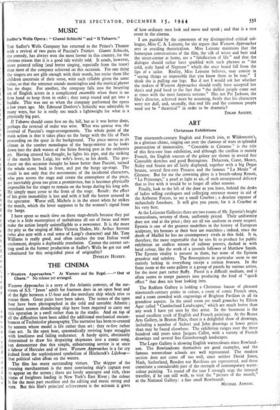MUSIC
Sadler's Wells Opera : " Gianni Schicchi " and " H Tabarro."
THE Sadler's Wells Company has returned to the Prince's Theatre with a revival of two parts of Puccini's Trittico. Gianni Schicchi, the comedy, has always won the most favour in this country, for the obvious reason that it is a good tale wittily told. It needs, however, more pointed telling (and better singing, especially from the tenor) than most of the company achieved on this occasion. For one thing the singers are not glib enough with their words, but recite them like children uncertain of their sense, with each syllable given the same value, so that the sentence sounds meaningless and the musical phrase has no shape. For another, the company falls into the besetting sin of English actors in a complicated ensemble when there is no firm hand to keep them in order ; they romp round and get into a huddle. This was not so when the company performed the opera a few years ago. Mr. Edmund Donlevy's Schicchi was admirable in many ways, but he is really too much a lightweight for what is a physically big part.
11 Tabarro should come first on the bill, but as it was better done, perhaps the reversal of order was wise. What was unwise was the reversal of Puccini's stage-arrangements. The whole point of the main action is that it takes place on the barge with the life of Paris proceeding on the quay in the background. The piece moves to its climax in the sombre monologue of the barge-master as he looks down into the dark waters of the Seine flowing past in the orchestra pit. Having uttered his thought, he lights his pipe, and the striking of the match lures Luigi, his wife's lover, to his death. The pro- ducer on this occasion thought he knew better than Puccini, turned the whole scene back to front, and put the barge up-stage. The result is not only that the movements of the incidental characters, who pass across the stage and create the atmosphere of the piece, are inevitably given too great a prominence, but it becomes physically impossible for the singer to remain on the barge during his long solo. He simply must come to the front of the stage. Result : the effect of his grim immobility is lost and with it half the horror aroused in the spectator. Worse still, Michele is in the street when he strikes the match, which the lover supposes to be the woman's signal from the barge.
I have spent so much time on these stage-details because they put what is a little masterpiece of melodrama all out of focus and must make the action largely unintelligible to a newcomer. It is the more the pity as the singing of Miss Victoria Sladen, Mr. Arthur Servent (who also acts with a real sense of Luigi's character) and Mr. Tom Williams is really good, and often catches the true Italian vocal excitement, despite a deplorable translation. Cannot the correct set- ting used in the former production at Sadler's Wells be got out and substituted for this misguided piece of originality?
DYNELEY HUSSEY.


























 Previous page
Previous page